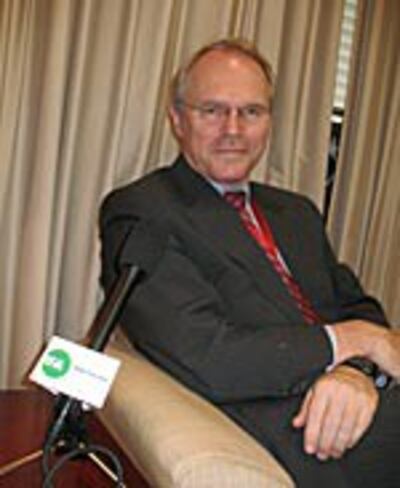
WASHINGTON—A senior U.S. official says he believes the United States has taken steps needed to unfreeze North Korean assets in a Macau bank, possibly paving the way for Pyongyang to shut down its nuclear program.
“I do believe we’ve more than done our part, and so I believe the issue is resolved as far as we’re concerned,” U.S. Assistant Secretary of State for East Asian and Pacific Affairs Christopher Hill told RFA’s Korean service, referring to U.S. $25 million in North Korean assets frozen in a Macau bank. “So we’ll have to see in the next few days.”
Asked if further sanctions were under consideration should North Korea continue to stall in neutralizing its nuclear program, Hill said: “We have not set any additional deadlines. What we have done is to make those funds available, and North Korea was very concerned about those funds in this Macau bank.”
“There have been a number of very complicated technical banking matters, which we’ve tried our best to deal with, and we believe North Korea ought to come to the table and start implementing their part of the bargain.”
“We want to make this work, we want to make this process work. And our frustration is that it’s so complicated. And so we hope that we can resolve this very soon,” Hill said.
Quitting isn't an option
There have been a number of very complicated technical banking matters, which we’ve tried our best to deal with, and we believe North Korea ought to come to the table and start implementing their part of the bargain....I think we have a number of options, but we do not have the option of walking away from this process.
Hill also insisted that walking away from the negotiating table with nuclear-armed North Korea isn’t an option for Washington. “We have to achieve progress, and if we don’t, we will have to look for other ways to achieve progress,” he said.
“We are focused very much on the diplomatic track… And if it doesn’t work, we’ll have to do something else. I think we have a number of options, but we do not have the option of walking away from this process. We have to find a way to solve this problem.”
On Feb. 13, North Korea agreed to shut down and seal for eventual abandonment its main nuclear site at Yongbyon by April 14, in exchange for 50,000 metric tons of heavy fuel oil, with 950,000 tons to follow after all nuclear activities were disclosed and disabled. North Korea missed the April 14 deadline because of a dispute over funds still frozen in Macau’s Banco Delta Asia.
“The North Koreans have said on several occasions that they will abide by the February agreement. So for now we’re taking them at their word. And we are trying to assist in the process of getting these funds in this Macau bank transferred,” Hill said.
“At some point, unfortunately, one would have to conclude that they are not interested. But for now, we believe they are interested in fulfilling their obligations, and we’re working under that assumption.”
Asked about the priority given to North Korea’s human rights record, Hill said the issue was no longer considered an internal affair.
“It is an affair that really has to do with how that government lives up to certain universal values and, frankly, lives up to certain international agreements, including the U.N. Charter,” he said.
Message to North Koreans
In a message directed to North Korean officials, Hill said, “I think America could be a very positive force on the Korean peninsula. And I think for the DPRK [Democratic People’s Republic of Korea] to be looking at a future, a future in which it can have a relationship with the U.S. would be a much better future than a future in which it treats the United States as some kind of enemy.”
“The United States does not have a hostile policy to the DPRK. It has a hostile policy to some of the things that the DPRK has been doing, namely producing these nuclear weapons… But I would think it would be in the DPRK’s interest to try to reach out and have a good relationship with the United States. And if the DPRK is interested in that—and that means giving up these nuclear ambitions—but if it’s interested in that, we will be very interested in reciprocating and in working with the DPRK.”
Original reporting by Changsop Pyon for RFA’s Korean service. Service director: Jaehoon Ahn. Additional reporting by Richard Finney. Produced and edited in English by Sarah Jackson-Han.
